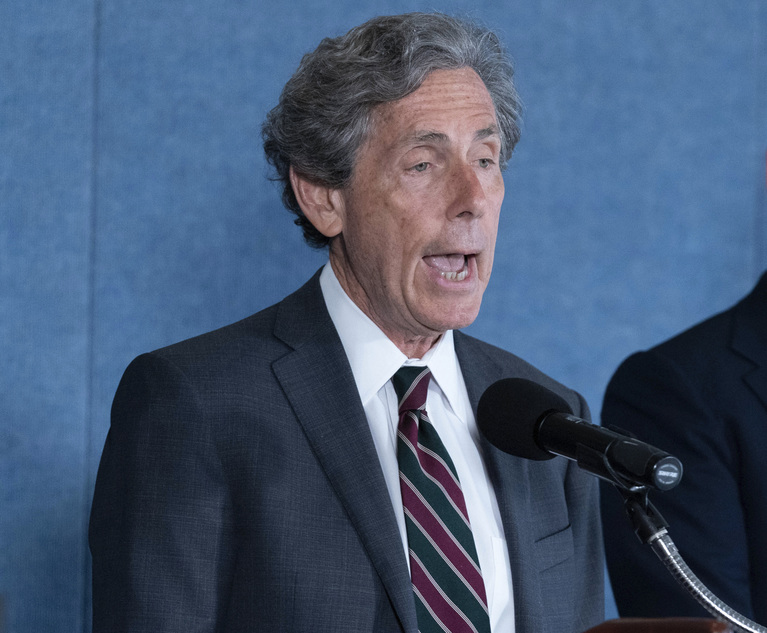
Activist Behind Supreme Court Affirmative Action Cases Is Now Suing Law Firms
Firms that offer some fellowships for diverse candidates are accused of racial discrimination against straight, white men.
Activist Behind Supreme Court Affirmative Action Cases Is Now Suing Law Firms
Ed Blum’s organization accuses firms offering fellowships for diverse candidates of racial discrimination against straight, white men

The conservative advocate who engineered the lawsuit behind the U.S. Supreme Court’s June decision to end race-conscious affirmative action in college admissions on Tuesday sued two law firms that offer fellowships for diverse candidates.
The lawsuits, filed by Edward Blum’s two-year-old anti-affirmative-action organization, American Alliance for Equal Rights, accuse the law firms of unlawful racial discrimination against white candidates. They ask the courts to remove race from consideration when selecting fellows. The law firms have offices in Texas and Florida. The suits are filed in federal courts in both states.
The lawsuits target the international law firms Perkins Coie and Morrison & Foerster, but fellowships for diverse candidates are common across the legal industry.
The suit filed in Texas is against Perkins Coie and alleges the firm has been “racially discriminating against future lawyers for decades” by limiting some fellowship positions to applicants who are “‘students of color,’ ‘students who identify as LGBTQ+,’ or ‘students with disabilities.’” The fellowships pay tens of thousands of dollars to first- and second-year law students and provide a pool of prospective employees to the firm where associate salaries can start around $190,000 a year, the suit says.
Perkins Coie couldn’t immediately be reached for comment. The firm touts its diversity on its website.
“For decades, we have been intentional and consistent in our efforts to increase the diversity of our workforce and to advance the values of diversity and inclusion in the legal profession,” the firm says.
The suit against Morrison & Foerster alleges that the firm’s Keith Wetmore Fellowship for Excellence, Diversity, and Inclusion only considers “African American/Black, Latinx, Native Americans/Native Alaskans, and/or members of the LGBTQ+ community.”
Representatives at Morrison & Foerster couldn’t be reached for comment. The firm’s Wetmore program is 10 years old and has awarded 136 fellowships, according to the firm’s website, which says the fellowship is for “first-year law students who are members of historically underrepresented groups in the legal industry.” Associate positions at the firm start at $215,000 a year, according to the suit. Hires are drawn from the fellowship programs.
The lawsuits follow the Supreme Court decision this summer involving Harvard College and the University of North Carolina at Chapel Hill that overturned nearly 50 years of race-conscious affirmative action at colleges and universities.
Blum said the American Alliance for Equal Rights had a valid basis for suing the firms because its members include nondisabled, straight white men in law schools in Texas and Florida who are ineligible for the fellowships.

Earlier this month, the American Alliance for Equal Rights sued an Atlanta-based venture-capital firm fund that supports Black women who own small businesses. The suit accused the firm of unlawful racial discrimination.

Supreme Court Bans Affirmative Action: What It Means for College Admissions
The Supreme Court has banned colleges from using race as admission criteria, essentially ending affirmative action. California did the same 25 years ago. WSJ explains how what happened then can offer a road map for what could happen now. / Photo Illustration: Madeline Marshall
The Supreme Court ruling has prompted a wide reconsideration of diversity efforts and has become a political lightning rod. Dozens of corporate law firms and major employers have received letters from Republican officials warning them to adhere to laws prohibiting racial quotas and preferences in employment and contracting decisions.
In June, U.S. Equal Opportunity Chair Charlotte A. Burrows said the Supreme Court decision banning racial preferences in college admission doesn’t address employer efforts to foster diverse and inclusive workforces.
“It remains lawful for employers to implement diversity, equity, inclusion, and accessibility programs that seek to ensure workers of all backgrounds are afforded equal opportunity in the workplace,” Burrows wrote.
Professor Vinay Harpalani of the University of New Mexico School of Law said he believed the case would prevail if it reached the Supreme Court.
“The court is really hostile to any use of race, any use of racial classification,” he said. “They basically said racial categories are just stereotyping so in that context, I would be worried if I was the corporations.”
But Harpalani also sees a work around: firms could open the fellowships up to students with different sorts of challenges not necessarily tied to race. The Supreme Court left some wiggle room for colleges and universities to do that. Now schools are tailoring essay questions to elicit responses that generate stories about identity, including race.
Law firms have long struggled with diversity, lagging particularly in the highest ranks where white men remain dominant in the highest paying and most powerful partner positions.
 which grew steadily since 2010. The number of Black associates has remained low, hovering around 5%.
which grew steadily since 2010. The number of Black associates has remained low, hovering around 5%. 



